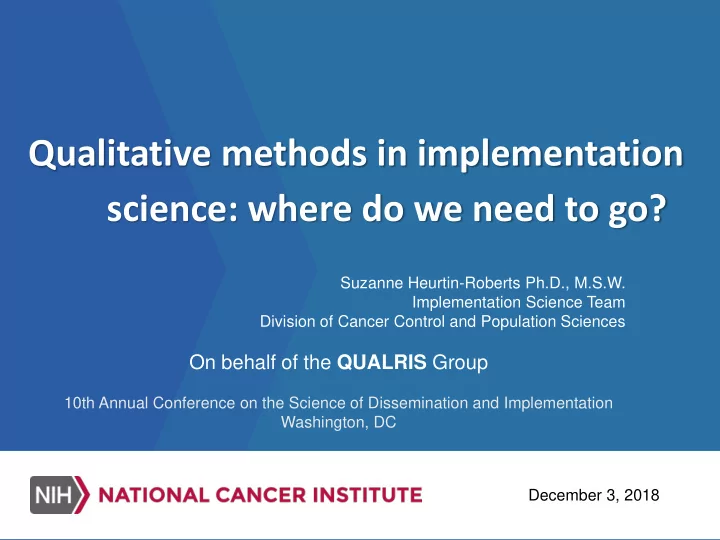

Qualitative methods in implementation science: where do we need to go? Suzanne Heurtin-Roberts Ph.D., M.S.W. Implementation Science Team Division of Cancer Control and Population Sciences On behalf of the QUALRIS Group 10th Annual Conference on the Science of Dissemination and Implementation Washington, DC December 3, 2018
Outline • What is the QUALRIS project? • Why did we do this? • About qualitative methods in implementation science • What needs to happen beyond the white paper? 2
Qualitative research in implementation science (QUALRIS) • Origins: Implementation Science Team, NCI • Team of experts in implementation science, qualitative methods, or both • To examine the use of qualitative research methods as used in Implementation Science and give guidance on their use 3
The QUALRIS Group Jennifer Leeman, DrPH, MDIV Deborah Cohen, PhD School of Nursing Department of Family Medicine Oregon Health and Science University University of North Carolina, Chapel Hill Benjamin F. Crabtree, PhD Deborah K. Padgett PhD, MPH Department of Family Medicine and Community Silver School of Social Work Health, Rutgers Robert Wood Johnson Medical New York University School Lawrence Palinkas, PhD Laura Damschroder, MS, MPH School of Social Work VA Ann Arbor Center for Clinical Management University of Southern California Research (PrOVE) QUERI, Ann Arbor, Michigan Borsika Rabin, PhD, MPH, PharmD Alison B. Hamilton, PhD, MPH VA San Diego and School of Medicine, VA Greater Los Angeles Healthcare System and UC San Diego and Triple Aim QUERI, Eastern Department of Psychiatry and Biobehavioral Colorado Healthcare System, Denver, Colorado Sciences, UCLA Heather Schacht Reisinger, PhD Suzanne Heurtin-Roberts PhD,MSW Iowa City VA Health Care System and Implementation Science Team, Division of Cancer Control and Population Carver College of Medicine, Sciences University of Iowa Healthcare System 4
QUALRIS Advisors Ross Brownson, PhD Bryan J. Weiner, PhD Brown School Department of Global Health School of Medicine Department of Health Services Washington University in St. Louis University of Washington Cam Escoffery, PhD, MPH Anne Sales, PhD, RN, MSN Rollins School of Public Health Emory University University of Michigan Medical School VA Ann Arbor Healthcare System Russell E. Glasgow, PhD School of Medicine University of Colorado 5
Purpose : 1) to call attention to key features and requirements for using qualitative methods in implementation science 2) to provide general guidance for the appropriate and rigorous use of qualitative approaches in implementation science 6
7
Background • Conversations starting in 2015 among a few persons • Noted: • importance and extensive use of qualitative methods in implementation science • variation in expertise with qualitative methods • little discussion of the specific challenges for using qualitative methods in implementation research. • need for guidance 8
More background (methods) • The group was expanded • Worked via email, conference calls, webinars and in person • Problems observed, challenges discussed • Consulted literature on qualitative methods • drew upon members’ own extensive experience in using these methods for implementation science • Drafted, revised many versions • Produced the QUALRIS white paper 9
October 2018: QUALRIS white paper was posted on NCI’s Implementation Team website. Direct link: https://cancercontrol.cancer.gov/IS/docs/NCI-DCCPS- ImplementationScience-WhitePaper.pdf 10
11
What’s in the QUALRIS white paper ? • “Traditional” qualitative methods vs. qualitative methods in implementation science • Use and value of qualitative methods in implementation science • Methodological considerations for rigor in data collection and analysis • Need for methodological innovation in the use of qualitative methods in implementation science 12
Key Considerations # 1-4 (p. 4) 1. Qualitative methods in implementation science tend to be more positivist and deductive in nature. 2. Qualitative methods in implementation science tend to be practical and targeted. 3. It’s inherently multidisciplinary rather than discipline - specific. 4. Qualitative and quantitative methods mixed methods 5. Implementation science usually involves qualitative research teams rather than solo researchers 13
Key Considerations #5-9 (p. 4) 5. Data collection often time limited, rapid with single or punctuated time points 6. Engagement tends to be with targeted stakeholders 7. Targeted to specific a priori research questions Published in grey literature as much as “academic” 8. scientific publications 14
Some problems observed in literature • Little variation in methodological approaches (focus groups, semi-structured interviews) • Inductive vs deductive approaches sometimes muddled • Lose sight of meaning and purpose • Misunderstanding of key concepts • Atheoretical or unclear methodological theory • “Grounded theory” is used as default 15
Some good practices • Be clear about your research question. • Data collection, sampling, analysis must be appropriate to answer research question. • Consider validity and reliability if in line with your approach. Some may consider trustworthiness. p. 14 • Strategies to enhance rigor, p. 15 • Leave an audit trail. • Document analytic process (rationales, meetings, decisions). • Transparency and documentation throughout, always. 16
And now what? • Use existing methods in innovative ways or developing entirely new methods. • Strengthen tools and techniques for conducting rapid qualitative assessment and analysis. • Explore methods of qualitative data collection and analysis not commonly used in implementation science. • Development of a common language • Develop meaningful and feasible approaches for cross- context comparison and synthesis of qualitative data. • Methodological discussion and debate • Methodological research and development. 17
Many thanks to the QUALRIS group, our advisors, and you! sheurtin@mail.nih.gov 18
Recommend
More recommend